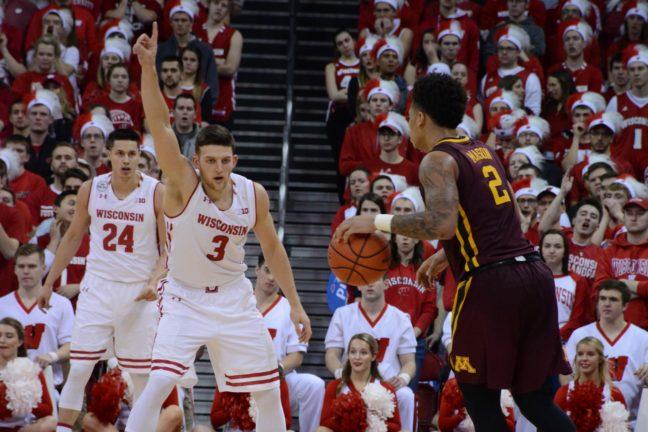With the Badger basketball season less than a week away, the team is missing one player who should be a major contributor to a squad poised to make an appearance in the NCAA tournament.
No, it is not due to injury as in previous years, but rather a nonsensical NCAA decision. Micah Potter transferred from The Ohio State University to the University of Wisconsin last December and was required to sit out the entirety of the 2018-19 season, per NCAA transfer rules.
But when the Badgers played their first game against Saint Mary’s on November 5, he will still not be able to play. In fact, barring a reversal of the NCAA’s decision, Potter will have to miss the team’s first 10 games.
On behalf of Potter, UW officials filed a petition to the NCAA to allow him to be eligible immediately for the start of the 2019-20 season, and were promptly denied, with no proper reason given. But the NCAA has granted the same waiver to more than three dozen other basketball players for this upcoming season, including Saint Mary’s guard Logan Johnson, who played 32 games as a freshman last season at Cincinnati.
How is it that a player who appeared in 32 games last year is able and eligible to play to start the year, but Potter, who sat out the entire season, is ineligible?
While NCAA guidelines allowed Potter to practice with the team, he is ineligible to participate in scrimmage games with other universities, exhibition games and the first 10 regular season games, which has rightfully angered Coach Greg Gard.
“He’ll sit longer than anybody else in the country,” Gard said. “There are so many that have played last year. I’m watching all these waivers get approved at 30-some games, 20-some games, and they’re immediately eligible. … Not many things make me raise my blood pressure. This is one that is.”
Potter, Gard and UW did everything by the book and were still rejected by the NCAA. Losing Potter for the first 10 games of the season could affect the Badgers’ chances at a Big Ten title and may dash any potential March Madness runs, as Potter was seen as one of the favorites to have a breakout season and receive major minutes at the forward position. Rather, the Badgers will now have to rely on younger players to fill Potter’s void in the meantime.
This waiver rejection highlights a larger issue for the NCAA — namely, the waiver process. Players such as Johnson, Quentin Grimes and Ty Stewart are some of the 48 players who have been granted waivers. As of Oct. 25, eight transfer waivers had been denied and 65 were still pending — this doesn’t make sense.
The NCAA’s process for determining eligibility is incredibly unclear. Typically, players such as Grimes and Johnson would be required by the NCAA to sit out the entirety of the 2019-20 season, as they appeared in a majority of their former teams’ games, but they will be on the court for the first game of the year.
Micah Potter is being punished by the NCAA for doing exactly what NCAA guidelines told him to do.
This is just one further example of the mess the NCAA has created by having uneven playing fields and poorly defined statutes and definitions. The Ohio State signed off on Potter’s transfer, Potter is a model student athlete and UW has proceeded in accordance with NCAA guidelines, meaning Micah Potter should be in uniform and on the Kohl Center court come Nov. 5.
William Keenan ([email protected]) is a senior studying political science.














